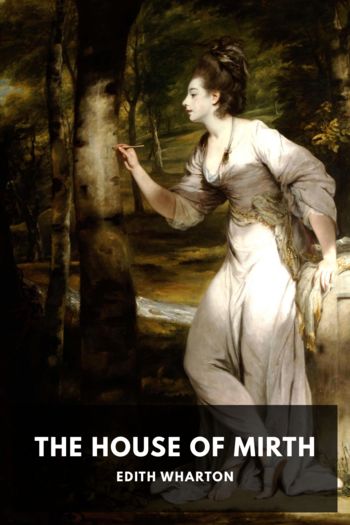The Age of Innocence - Edith Wharton (8 ebook reader .txt) 📗

- Author: Edith Wharton
Book online «The Age of Innocence - Edith Wharton (8 ebook reader .txt) 📗». Author Edith Wharton
“Now we shan’t have to talk,” he said, smiling into her candid eyes, as they floated away on the soft waves of the “Blue Danube.”
She made no answer. Her lips trembled into a smile, but the eyes remained distant and serious, as if bent on some ineffable vision. “Dear,” Archer whispered, pressing her to him: it was borne in on him that the first hours of being engaged, even if spent in a ballroom, had in them something grave and sacramental. What a new life it was going to be, with this whiteness, radiance, goodness at one’s side!
The dance over, the two, as became an affianced couple, wandered into the conservatory; and sitting behind a tall screen of tree-ferns and camellias Newland pressed her gloved hand to his lips.
“You see I did as you asked me to,” she said.
“Yes: I couldn’t wait,” he answered smiling. After a moment he added: “Only I wish it hadn’t had to be at a ball.”
“Yes, I know.” She met his glance comprehendingly. “But after all—even here we’re alone together, aren’t we?”
“Oh, dearest—always!” Archer cried.
Evidently she was always going to understand; she was always going to say the right thing. The discovery made the cup of his bliss overflow, and he went on gaily: “The worst of it is that I want to kiss you and I can’t.” As he spoke he took a swift glance about the conservatory, assured himself of their momentary privacy, and catching her to him laid a fugitive pressure on her lips. To counteract the audacity of this proceeding he led her to a bamboo sofa in a less secluded part of the conservatory, and sitting down beside her broke a lily-of-the-valley from her bouquet. She sat silent, and the world lay like a sunlit valley at their feet.
“Did you tell my cousin Ellen?” she asked presently, as if she spoke through a dream.
He roused himself, and remembered that he had not done so. Some invincible repugnance to speak of such things to the strange foreign woman had checked the words on his lips.
“No—I hadn’t the chance after all,” he said, fibbing hastily.
“Ah.” She looked disappointed, but gently resolved on gaining her point. “You must, then, for I didn’t either; and I shouldn’t like her to think—”
“Of course not. But aren’t you, after all, the person to do it?”
She pondered on this. “If I’d done it at the right time, yes: but now that there’s been a delay I think you must explain that I’d asked you to tell her at the Opera, before our speaking about it to everybody here. Otherwise she might think I had forgotten her. You see, she’s one of the family, and she’s been away so long that she’s rather—sensitive.”
Archer looked at her glowingly. “Dear and great angel! Of course I’ll tell her.” He glanced a trifle apprehensively toward the crowded ballroom. “But I haven’t seen her yet. Has she come?”
“No; at the last minute she decided not to.”
“At the last minute?” he echoed, betraying his surprise that she should ever have considered the alternative possible.
“Yes. She’s awfully fond of dancing,” the young girl answered simply. “But suddenly she made up her mind that her dress wasn’t smart enough for a ball, though we thought it so lovely; and so my aunt had to take her home.”
“Oh, well—” said Archer with happy indifference. Nothing about his betrothed pleased him more than her resolute determination to carry to its utmost limit that ritual of ignoring the “unpleasant” in which they had both been brought up.
“She knows as well as I do,” he reflected, “the real reason of her cousin’s staying away; but I shall never let her see by the least sign that I am conscious of there being a shadow of a shade on poor Ellen Olenska’s reputation.”
IVIn the course of the next day the first of the usual betrothal visits were exchanged. The New York ritual was precise and inflexible in such matters; and in conformity with it Newland Archer first went with his mother and sister to call on Mrs. Welland, after which he and Mrs. Welland and May drove out to old Mrs. Manson Mingott’s to receive that venerable ancestress’s blessing.
A visit to Mrs. Manson Mingott was always an amusing episode to the young man. The house in itself was already an historic document, though not, of course, as venerable as certain other old family houses in University Place and lower Fifth Avenue. Those were of the purest 1830, with a grim harmony of cabbage-rose-garlanded carpets, rosewood consoles, round-arched fireplaces with black marble mantels, and immense glazed bookcases of mahogany; whereas old Mrs. Mingott, who had built her house later, had bodily cast out the massive furniture of her prime, and mingled with the Mingott heirlooms the frivolous upholstery of the Second Empire. It was her habit to sit in a window of her sitting-room on the ground floor, as if watching calmly for life and fashion to flow northward to her solitary doors. She seemed in no hurry to have them come, for her patience was equalled by her confidence. She was sure that presently the hoardings, the quarries, the one-story saloons, the wooden greenhouses in ragged gardens, and the rocks from which goats surveyed the scene, would vanish before the advance of residences as stately as her own—perhaps (for she was an impartial woman) even statelier; and that the cobblestones over which the old clattering omnibuses bumped would be replaced by smooth asphalt, such as people reported having seen in Paris. Meanwhile, as everyone she cared to see came to her (and she could





Comments (0)